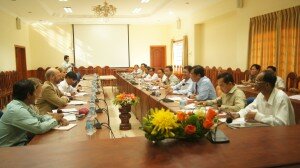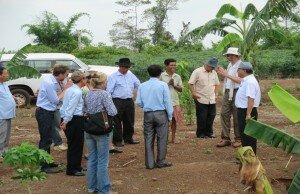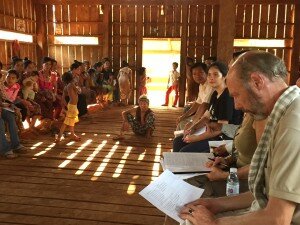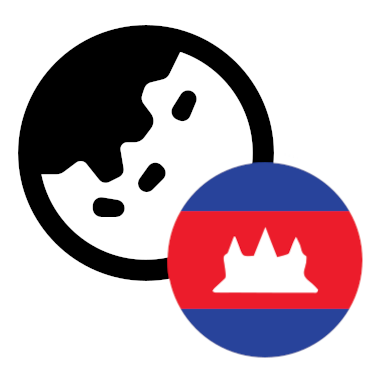
24 April 2015 – Meeting between German Ambassador H.E. Joachim Baron von Marschall and Kratie provincial working group co-chaired by H.E Sar Samrong, Provincial Governor, and H.E Dr. Sareth Boramy, Director of Land Distribution Sub Sector Program at MLMUPC, LASED Project Director (picture by GIZ).
April 23-28, 2015
Northeastern Cambodia – German Ambassador H.E. Joachim Baron von Marschall, senior GIZ officials and development partners visited a trip to Northern Cambodia to witness first-hand land tenure security and food security issues for indigenous communities. The field trip was an opportunity for officials to experience the challenges and achievements of GIZ’s Land Rights Programme (LRP), GIZ’s Improvement of Livelihood and Food Security (ILF) Project, and Deutsche Welthungerhlilfe (WHH)’s projects. More than 100 representatives joined the delegation to Kratie, Ratanakiri, Mondulkiri and Tbong Khmum Provinces to learn about issues surrounding land tenure, food security and livelihood support for Idigenous Communities, and former landless and land-poor households.
To gain a practical understanding of German funded activities, the delegation visited two former Land Allocation for Economic Development (LASED) communities and five indigenous people communities. Former LASED community members reported on their improved livelihood and food security situation after receiving support for community development.
One representative highlighted how the set-up of a community shop contributed to better living conditions for him and his family.

28 April 2015 – The German delegation visited Land Recipient’s farm together with H.E. Dr. Sareth Boramy, Director of Land Distribution Sub Sector Program at MLMUPC, LASED Project Directorwith H.E. Sar Sovann, Secretary of State at MLMUPCin Sreleu Senchey community in Tbong Khmum Province, which is supported by GIZ ILF (picture by GIZ).
Another representative from the indigenous La Eun Kraen community in Ratanakiri introduced her small business on weaving and selling traditional indigenous scarfs. In other indigenous people communities, community committees and representatives reported the problems they have been facing with land encroachment and illegal logging. They likewise reported on the advantages of owning collective land titles. Community members introduced their natural resources and land management approaches to the delegation, and discussed their strategies to secure their land tenure.
In each province, the delegation also had the opportunity to meet with authorities and discuss social and economic land concessions and the communal land registration of indigenous people communities. Delegates discussed development potentials in these provinces with officials and reflected on other German supported projects. NGOs and partner organisations were also invited to share their progress on related work.

25 April 2015 – German Ambassador H.E. Joachim Baron von Marschall meets indigenous representatives of Kres community in Ratanakiri as well as representatives from EC and NTFP to discuss the communal land registration and the procedure of a land conflict resolution between the community and Hagl Economic Land Concession Company (picture by GIZ).
During the five-day trip, the delegation achieved a good understanding of the complexity of securing land tenure for indigenous people communities and the efforts which are necessary to improve the livelihood of the former landless and indigenous HHs. The delegation valued the achievements of GIZ LRP II, GIZ ILF, and WHH commissioned by BMZ and also realized that the communities need to take responsibility and ownership to secure their land rights. It became clear that not only land titling but also the capacity of the indigenous people communities need to be empowered to take action as well as to collaborate with other stakeholders such as local and provincial authorities to ensure land tenure security.

